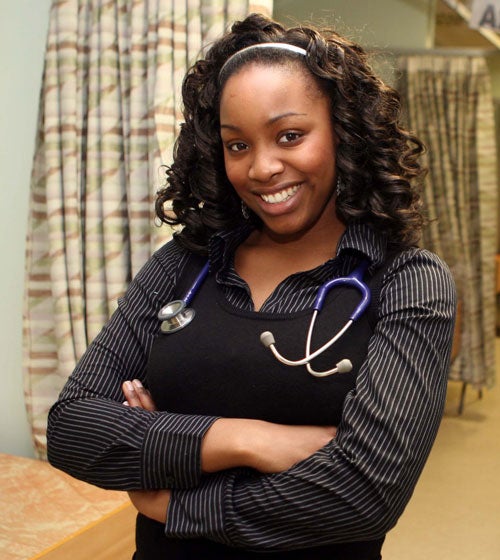Students from poorer backgrounds 'catch up' at university

Your support helps us to tell the story
From reproductive rights to climate change to Big Tech, The Independent is on the ground when the story is developing. Whether it's investigating the financials of Elon Musk's pro-Trump PAC or producing our latest documentary, 'The A Word', which shines a light on the American women fighting for reproductive rights, we know how important it is to parse out the facts from the messaging.
At such a critical moment in US history, we need reporters on the ground. Your donation allows us to keep sending journalists to speak to both sides of the story.
The Independent is trusted by Americans across the entire political spectrum. And unlike many other quality news outlets, we choose not to lock Americans out of our reporting and analysis with paywalls. We believe quality journalism should be available to everyone, paid for by those who can afford it.
Your support makes all the difference.Students with lower A-level grades from some of the country's poorest performing schools do just as well as high flyers from the independent or selective sector in their degrees, according to ground-breaking new research.
The findings have been seized on as vindication by campaigners who argue that universities should embrace positive discrimination to help candidates from struggling comprehensives.
The study looked at students at St George's Medical School, University of London – one of the most prestigious medical schools in the country – where students from schools with low exam results can obtain a place with two Bs and a C grade pass, instead of the normal requirement of two As and a B grade pass.
All they have to do is show that their A-level results are 60 per cent better than the average for their school.
It revealed that in their first-year exams there was less than a 1 per cent difference – considered by statisticians to be insignificant – in the marks obtained by those with lower A-level grades when compared to those youngsters admitted under the standard route.
St George's claims theresearch is the most authoritative of its kind in the UK. Previously, campaigners have had to rely on research by Harvard in the US and anecdotal evidence from Bristol University, where a similar scheme was mounted.
Kenton Lewis, assistant registrar in charge of fair access at St George's, said: "Without the scheme, the majority of these students would not have had the opportunity to study medicine. This is a clear indication that our innovative scheme has successfully widened participation without lowering standards."
The findings are likely to reignite the row over whether universities should allow applicants from deprived homes the opportunity to take up a place even if they have lower A-level grades than rival candidates.
In the past, independent schools have warned they could take legal action if one of their pupils with higher grades was refused a place.
An independent schools' report by Professor Alan Smithers, head of the Centre for Education and Employment Research at the University of Buckingham, argued that it would beillegal to discriminate on grounds of gender and ethnicity, adding: "It is difficult to see how positive discrimination on one characteristic can be against the law – while it can be advocated on another which has less of a connection with degree results."
When Cambridge University told admissions tutors that seven A-grade GCSE passes by a pupil from a poorly performing school should be treated as equal to eight A* grade passes from a "highly selective school", independent schools claimed the suggestion was "disturbing" and "discriminatory".
However, universities which offer some state school pupils places on lower A-level grades will seize on the St George's evidence – claiming that it backs their decisions to treat applicants individually rather than just have a blanket bar on anyone who does not meet the grade.
Ministers have been reluctant to sanction positive discrimination in favour of candidates from struggling schools – arguing that the final decision must be that of the individual universities.
Few have adopted such radical measures as St George's which offers places to more than 2,600 healthcare students.
Most of the universities who are members of the elite Russell group, which represents the top 20 research-funded higher education institutions in the UK, fall well behind their benchmarks for taking on students from disadvantaged areas.
'I would like to be a GP' - Mojisola Giwa's story
Ms Giwa, 22, could have been lost to medicine had it not been for the St George's initiative. She studied for A-levels at Newham sixth-form college in east London, so qualified for the scheme under which youngsters from poorly performing schools and colleges can obtain places despite not achieving grades as good as students from privileged backgrounds. She was offered a place at George's provided she got four B-grade passes, as opposed to the two As and a B traditionally demanded of candidates.
Ms Giwa's generation – she has a sister and two brothers – are the first from her family to enter higher education. "If it wasn't for the St George's scheme, it could have been impossible for me to study medicine," she said.
Ms Giwa, whose family – originally from Nigeria – live in the Newham area, began taking an interest in medicine at an early age, starting with an interest in Parkinson's disease.
She will complete her five-year medicine course at St George's in 2009. "I would like to become a GP," she said. "I might practise in the Newham area, although I don't know yet."
She said there was no distinction at the university between students recruited under the "adjusted criteria" offer and those who entered via the traditional route.
Join our commenting forum
Join thought-provoking conversations, follow other Independent readers and see their replies
Comments